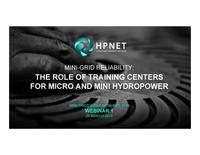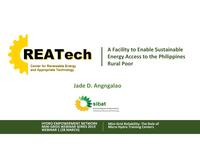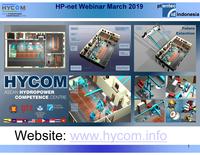Difference between revisions of "Mini-Grid Webinar Series 2019"
***** (***** | *****) m |
***** (***** | *****) m |
||
| Line 1: | Line 1: | ||
| − | |||
'''[[Mini-grid Webinar Series|►Link to Mini-Grid Webinar Series 2017]]''' | '''[[Mini-grid Webinar Series|►Link to Mini-Grid Webinar Series 2017]]''' | ||
| Line 118: | Line 117: | ||
| style="width: 176px" | [[File:Dulal.png|left|150pxpx|alt=Webinar banie.png|link=]] | | style="width: 176px" | [[File:Dulal.png|left|150pxpx|alt=Webinar banie.png|link=]] | ||
| style="width: 566px" | | | style="width: 566px" | | ||
| − | '''DINESH DULAL'''Mr. Dinesh Dulal has completed Master’s Degree in Management and Bachelor’s Degree in Law. He has spent almost 18 years in banking sector, out of which he has spent more than 10 years in renewable energy financing. Currently, he is the Department Head of Energy and Development Organization Department at NMB Bank Ltd., Kathmandu, Nepal. He has played an instrumental role in renewable energy financing including micro hydro project financing. | + | '''DINESH DULAL''' |
| + | Mr. Dinesh Dulal has completed Master’s Degree in Management and Bachelor’s Degree in Law. He has spent almost 18 years in banking sector, out of which he has spent more than 10 years in renewable energy financing. Currently, he is the Department Head of Energy and Development Organization Department at NMB Bank Ltd., Kathmandu, Nepal. He has played an instrumental role in renewable energy financing including micro hydro project financing. | ||
|- | |- | ||
| style="width: 176px" | | | style="width: 176px" | | ||
| Line 216: | Line 216: | ||
__NOTITLE__ __NOAUTHORLIST__ __NOEDITSECTION__ | __NOTITLE__ __NOAUTHORLIST__ __NOEDITSECTION__ | ||
| + | [[Category:Mini-grid]] | ||
[[Category:Micro-Hydro/Pico-Hydro]] | [[Category:Micro-Hydro/Pico-Hydro]] | ||
| − | |||
Revision as of 01:54, 21 June 2019
►Link to Mini-Grid Webinar Series 2017
|
Mini-Grids Webinar Series 2019 |
The Hydro Empowerment Network (HPNET) is a south-south, knowledge exchange and advocacy platform to advance small-scale (<1MW) hydropower. HPNET, in partnership with the WISIONS of Sustainability Initiative and Energypedia, is conducting a 4-part, quarterly webinar series on mini-grids.
Renewable energy mini-grids are a cost-effective and reliable solution for energy access. Within the technologies available for mini-grids, micro and mini hydropower (MHP)1 has added advantages. It's techno-economic characteristics, such lower levelized cost of electricity, per kilowatt cost, and no need for battery storage, make it economically viable for grid interconnection and productive end use applications. read more
Because MHP hardware can be manufactured locally and maintained by local actors, MHP development imparts local skills and jobs, which can evolve into local MHP enterprises. In addition, MHP strengthens catchment area and watershed protection, in turn increasing the climate resilience of vulnerable communities in hilly regions.
The number of hydro mini-grids in rural areas of Asia, Africa, and Latin America far exceed other types of mini-grids. As a proven technology with an extensive track record, micro and mini hydropower is the focus in this mini-grid webinar series. The objective of the series is to facilitate exchange among diverse actors advancing small-scale hydro, and promote approaches that lead to long-term success and optimal local benefits. Each of the four webinars will respectively provide insight on MHP reliability, sustainability, financing, and planning for scalability.
[1] In this context, micro hydropower refers to <100kW, and mini hydropower refers to 100 - 1000 kW (or 1MW).
1st Webinar
Mini-Grid Reliability: The Role of Training Centers for Micro/Mini Hydropower
Webinar Recording
Micro and mini hydropower (MHP) implementation involves technical expertise in hydrology, civil works, electro-mechanical, electrical, and electronics. Thanks to the pioneers of knowledge transfer for small-scale hydropower, e.g. the Intermediate Technology Development Group (ITDG), Skat Foundation, HydroNet, and others, comprehensive and frequent training was made available in the 1990s to practitioners in the global south. While such training is rare in the present-day scenario, the earlier efforts led to the creation of local experts who have since established local training centers. The Southeast Asia region particularly benefits from micro hydropower training centers. This webinar – the 1st in a series of four webinars – will feature the following training centers that provide local capacity building for the development, operation, and maintenance of community-based micro hydro projects in Indonesia, Malaysia, and the Philippines.
- Tonibung Center for Renewable Energy and Appropriate Technology (CREATE), Malaysia
- ASEAN Hydropower Competence Centre (HYCOM), Indonesia
- SIBAT Center for RE and Appropriate Technology (CREATech), Philippines
read more
We will hear from the founders or coordinators of the centers, presenting the motivation, concept, and evolution of the centers. They will explain the training facilities, types of training, the center’s sustainability, and the impact the centers have had on the reliability of micro hydropower projects.
Presentations will be followed by a Question/Answer session open to all participants.
Download the Presentations
Speakers
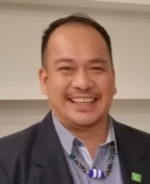 |
HON. ADRIAN BANIE LASIMBANG |
 |
JADE ANGANGALAO |
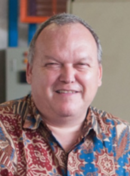 |
GERHARD FISCHER |
Moderator | |
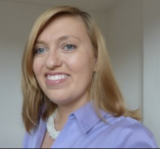
|
MOLLY HURLEY-DEPRET |
Thematic Discussant
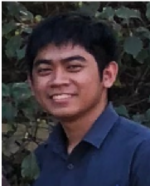 |
LANZ GABRIEL JABLA |
2nd Webinar: (June 2019)
Mini-Grid Financing: Enabling the Role of Local Banks
Friday, 28 June 2019 at 3:00 pm CEST.
Register: https://register.gotowebinar.com/register/286958640442813452
This webinar – the 2nd in a series of four webinars – will feature banks and financing specialists from South and Southeast Asia who have enabled local banks and local developers in the region to make financing available for small-scale hydro mini-grids. Using specific examples, speakers will present:
- Why and how local banks are critical to replication of sustainable hydro mini-grids
- Incentives for local banks in lending to hydro mini-grids and local developers
- How local banks can build internal capacity to lend to mini-grids
- How local developers can develop the necessary skills to access local bank financing
- How banking regulatory challenges can be overcome
- Roles of government and donors help to accelerate the process of enabling local bank financing.
Speakers
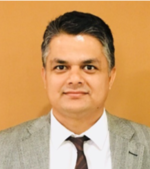 |
DINESH DULAL Mr. Dinesh Dulal has completed Master’s Degree in Management and Bachelor’s Degree in Law. He has spent almost 18 years in banking sector, out of which he has spent more than 10 years in renewable energy financing. Currently, he is the Department Head of Energy and Development Organization Department at NMB Bank Ltd., Kathmandu, Nepal. He has played an instrumental role in renewable energy financing including micro hydro project financing. |
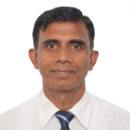 |
KAPILA SUBASINGHE Mr. Kapila Subasinghe is Vice President of Specialized Project Lending and the Head of Consulting at DFCC Bank, Sri Lanka. He is the former Project Director of the World Bank and Global Environment Facility funded Renewable Energy for Rural Economic Development (RERED) Project of the Government of Sri Lanka. He has 25 years of experience in project management and lending. He has served both in SME and Corporate sectors at DFCC, specializing in project financing including lending to off-grid and grid-connected renewable energy sectors. In 2002, he joined the Project Management Department which managed credit lines to Sri Lanka from multilateral agencies. He headed the Department from 2007 to 2010 as Vice President (Project Management) managing four credit lines offered to the Government of Sri Lanka by The World Bank, Asian Development Bank, European Investment Bank, and KfW. Thereafter, he served as Vice President (Corporate Banking) from 2010 to 2015. As Vice President (Specialized Project Lending)/Head of Consulting he oversees the evaluation and implementation of complex/specialized projects across the branch network of the bank, as well as management of DFCC Consulting (Pvt) Ltd. He is currently serves as Project Manager of the Project Implementation Unit of the ADB funded Rooftop Solar Power Generation Project of the Government of Sri Lanka. He has been a resource person to multiple local and international renewable energy forums, including for delegations to Sri Lanka from Asia and Africa to study the Sri Lankan renewable energy model. He was also the Team Leader of an assignment in Uganda undertaken by DFCC Consulting to develop an adoptable solar loan product for participating financial institutions, under the Energy for Rural Transformation Project of Uganda supported by the World Bank. Mr. Subasinghe holds a degree in civil engineering from University of Moratuwa, Sri Lanka and is a Fellow Member of the Chartered Institute of Management Accountants, UK. |
 |
MARGARITA MANZO |
Moderator | |

|
RANISHA BASNET |
Thematic Discussant
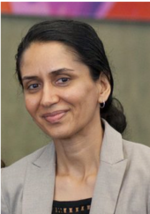 |
DIPTI VAGHELA Dipti Vaghela is the co-founder and manager of the Hydro Empowerment Network (HPNET), a south-south knowledge exchange platform that advances policy, technology, and socio-environmental aspects of small-scale hydropower across ten countries since established in 2013. Dipti brings sixteen years of experience in developing decentralized renewable energy solutions for rural electrification in S/SE Asia, bridging communities, local entrepreneurs, field-based NGOs, policy makers, and funding agencies. After a product design career in Silicon Valley, she spent ten years with indigenous communities in rural India, mostly in Kalahandi, Odisha, establishing localized energy solutions. In 2013, supported by the Switzer Foundation Environmental Leadership Grant, Dipti served as International Rivers' energy solutions coordinator to promote policy solutions that support equitable energy development. In 2016 she was awarded a Fulbright Public Policy Fellowship, placed at the Renewable Energy Association of Myanmar (REAM). Based in Myanmar, she supports and learns from Myanmar’s indigenous micro/mini hydropower, biomass energy, PV-irrigation practitioners. Dipti holds a Bachelor of Science in Mechanical Engineering from the University of California, Berkeley and a Master of Science in Environmental Studies from San Jose State University.
|
3rd Webinar (September 2019)
Mini-Grid Sustainability: Transitioning to Enterprise-based Micro Hydropower
September 2019
Collective research and observations within the Hydro Empowerment Network reveal that the long-term sustainability of community-based micro and mini hydropower projects is dependent on whether the project is run as enterprise. This webinar – the 3rd in the series – will feature practitioners in Myanmar, Nepal, and Pakistan who are enabling enterprise-based micro and mini hydropower projects.
Stay tuned for details!
4th Webinar: (December 2019)
Mini-Grid Planning: Data Mapping Tools for Multi-Actors
December 2019
Map-based planning tools can be useful for various stakeholders of mini-grid implementation:
- Policy makers and advocacy groups can use map-based tools to assess the cost, time, and performance aspects of mini-grids versus the main grid for rural and remote areas, and opportunities for interconnection.
- Funding agencies and developers can use map-based data to determine the natural resource viability of different technologies, e.g. will the PV system be the viable during monsoon months, will the micro hydro system be viable during the dry months, etc.
- Civil society organizations and community-based groups can use map-based tools to develop local level energy planning, e.g. interconnecting mini-grids to each other.
These webinar will feature the latest in the state of the art mapping tools for mini-grids planning!
Stay tuned for details! <headertabs></headertabs>
Organizers
|
The Hydro Empowerment Network (HPNET) is a knowledge exchange and advocacy platform for micro/mini hydro practitioners in south and southeast Asia, focusing on policy, technology, and socio-environment solutions for long-term sustainability. Core support for HPNET comes from the WISIONS initiative at the Wuppertal Institute for Climate, Environment and Energy. | |
|
WISIONS of Sustainability initiative's main objective is to make clean energy a default solution for basic energy needs in developing regions, by helping local partners to identify successes and bring them to scale through regional networks, marketing and demonstration. | |
| Energypedia UG is a non-profit organization that runs and maintains the wiki-based platform, www.energypedia.info. Energypedia.info is an online platform for collaborative knowledge exchange on renewable energy, energy efficiency and energy access in the context of development cooperation. |

